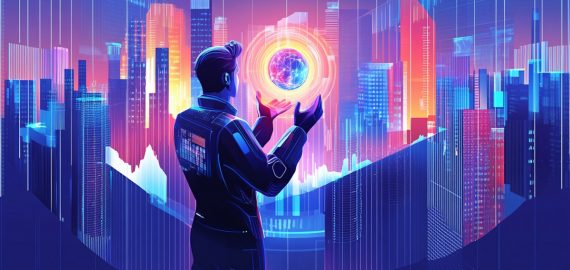The Rise of Non-Fungible Tokens (NFTs) in the Art and Entertainment Industries


In Brief
Exploring the Impact of NFTs: A Dive into Digital Art, Blockchain, and Entertainment. Delve into the revolutionary rise of Non-Fungible Tokens (NFTs) and their transformative influence across art, entertainment, and beyond. From redefining ownership in the digital realm to empowering creators with new revenue streams, discover how NFTs are reshaping industries and challenging traditional norms. Join us as we navigate the opportunities, challenges, and future potential of this groundbreaking technology.
In recent years, the meteoric rise of Non-Fungible Tokens (NFTs) has been nothing short of a digital revolution, captivating not only the worlds of art and entertainment but also extending its transformative reach into diverse sectors. These unique digital assets, residing securely on blockchain technology, have transcended their humble beginnings, ushering in a new era of creativity, ownership, and innovation. In this article, Metaverse Post wants to provide you with an understanding of how new technologies can be incorporated into the art industry.

Non-fungible Tokens represent ownership of a singular, irreplaceable item in the digital realm. These items can manifest in various forms, from digital artworks to virtual real estate, each imbued with its unique value and authenticity. Unlike fungible tokens such as cryptocurrencies, NFTs are indivisible and cannot be exchanged on a one-to-one basis due to their unique characteristics. What distinguishes NFTs is their immutability and traceability, thanks to their presence on a blockchain, a decentralised ledger that ensures transparent and tamper-proof ownership records.
The fusion of digital art and crypto has given birth to a thriving community of people. The impact of NFT on the art and culture world cannot be overstated, as they challenge traditional notions of ownership, provenance, and value. In a landmark moment in March 2021, an NFT digital art object by the artist Beeple sold at Christie’s auction house for a record-breaking $69.3 million, thrusting NFTs into the mainstream spotlight and cementing their place in art history.
Marketplaces such as OpenSea and Rarible have democratised the art market, providing rising NFT artists with direct access to a global audience and enabling them to monetise their digital creations without intermediaries. Moreover, the introduction of smart contracts allows artists to earn royalties on secondary sales, providing a sustainable source of income and empowering creators in unprecedented ways.
Entertainment industries like music have also embraced the transformative potential of NFTs, offering fans unique and immersive experiences that transcend traditional boundaries. Musicians, such as Kings of Leon and Grimes, have leveraged NFTs to release exclusive songs and albums, accompanied by behind-the-scenes content and interactive experiences. Icons such as Rolling Stone have embraced the potential of NFTs, launching exclusive collections that offer fans unique experiences and memorabilia tied to their favourite artists and cultural moments.
The concept of music on the blockchain extends beyond mere distribution, encompassing a spectrum of possibilities, including fan engagement, royalty management, and decentralised collaborations. Through crypto music, musicians can release exclusive tracks, albums, and experiences directly on the blockchain, bypassing traditional intermediaries and empowering themselves with newfound autonomy. NFT rap has emerged as a particularly vibrant subculture within the broader music ecosystem, with artists exploring innovative ways to leverage blockchain technology to connect with fans and monetise their craft.
Film studios are venturing into the NFT space, providing collectors with access to exclusive content related to blockbuster movies and forging deeper connections with their fan base. By tokenising movie memorabilia and offering limited-edition NFTs, studios are transforming the way fans engage with their favourite films, creating new avenues for monetisation and fan interaction.
Despite their transformative potential, NFTs are not without challenges and considerations. The unregulated nature of the NFT market poses risks of fraud, copyright infringement, and intellectual property disputes, necessitating greater oversight and regulation. Moreover, environmental concerns surrounding the energy-intensive process of minting and trading NFTs highlight the need for sustainable solutions and eco-friendly blockchain technologies.
In conclusion, the emergence of NFTs represents a paradigm shift in how we create, consume, and interact with digital assets. From democratising art ownership to revolutionising entertainment experiences and pioneering new frontiers in business and technology, NFTs are reshaping the very essence of our digital economy. As we embark on this transformative journey, it is imperative to embrace the potential of NFTs while addressing the challenges and considerations that accompany their adoption. By harnessing the power of blockchain technology and fostering collaboration across industries, we can unlock the full potential of NFTs and usher in a new era of digital innovation and creativity.
Disclaimer
In line with the Trust Project guidelines, please note that the information provided on this page is not intended to be and should not be interpreted as legal, tax, investment, financial, or any other form of advice. It is important to only invest what you can afford to lose and to seek independent financial advice if you have any doubts. For further information, we suggest referring to the terms and conditions as well as the help and support pages provided by the issuer or advertiser. MetaversePost is committed to accurate, unbiased reporting, but market conditions are subject to change without notice.
About The Author
Victoria is a writer on a variety of technology topics including Web3.0, AI and cryptocurrencies. Her extensive experience allows her to write insightful articles for the wider audience.
More articles

Victoria is a writer on a variety of technology topics including Web3.0, AI and cryptocurrencies. Her extensive experience allows her to write insightful articles for the wider audience.


















































